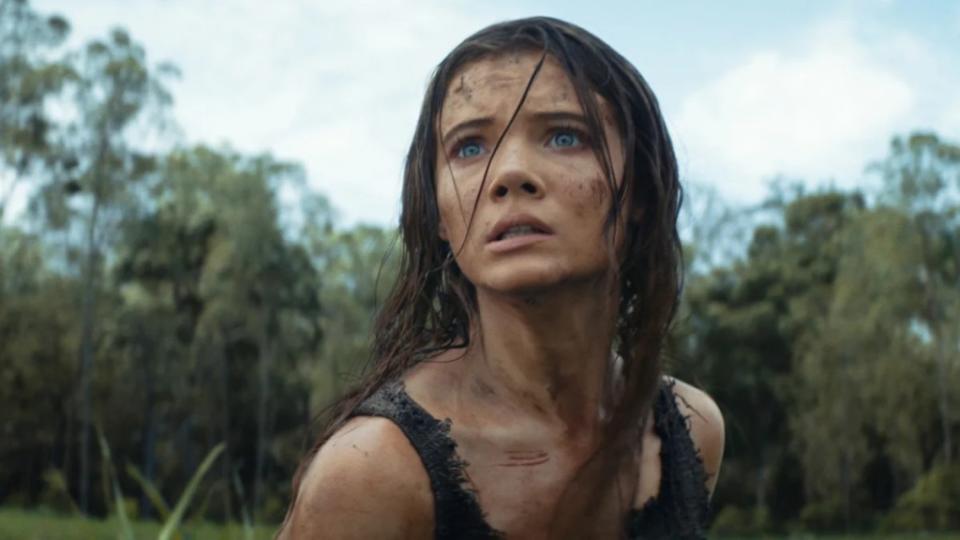‘Kingdom of the Planet of the Apes’ Review: Sequel Is a De-Evolution for the Franchise
- Oops!Something went wrong.Please try again later.
- Oops!Something went wrong.Please try again later.
If you ask me what I think the best sci-fi franchise of all time is, I won’t say “Star Wars” or “Star Trek.” I’m going to say “Planet of the Apes.” The original five films and the recent trilogy (the less said about the 2001 Tim Burton remake the better) are some of the most exciting sci-fi movies to come out of Hollywood as they frequently take big narrative swings, and are unafraid to go some dark, tragic places to hit upon rich subtext about the shortcomings of humanity.
Wes Ball’s “Kingdom of the Planet of the Apes” is a continuation of the story that began with 2011’s “Rise of the Planet of the Apes,” but it completely abandons the tradition that made the series so distinctive and interesting. Instead, Ball’s movie — intended as the start of a new story arc featuring new characters — is the typical bloated and bland franchise fodder that can only come out of a Hollywood that relishes IP as far as its name and no further.
Set “many generations later” after the conclusion of 2017’s “War for the Planet of the Apes,” the new movie follows Noa (Owen Teague), an ape who lives in a peaceful village where the apes use birds of prey to catch fish. Unfortunately for Noa, his village gets on the radar of troops belonging to Proximus Caesar (Kevin Durand), who burns the hamlet to the ground and kidnaps or kills almost all of the inhabitants. Noa survives the attack and goes searching for his captured clan only to cross paths with the wise orangutan Raka (Peter Macon) and a young human woman (Freya Allan), who is the true target of Proximus’ forces. The trio then makes their way to Proximus’ “kingdom” only to discover that the new Caesar’s goals extend further than capturing a single human woman and a bunch of rural apes.
Andy Serkis’ Caesar, the hero of the recent “Apes” trilogy, is admittedly a tough act to follow, but Noa is a total nothing of a character. There’s little that defines him, and his journey doesn’t provide any further insight into what he wants or needs. Instead, he functions more as a clumsy audience surrogate, moving us through this post-Caesar world to learn about its truths as we do. But there are no core beliefs to his actions. In one of the film’s clunkier moments, Noa gets his mojo back by reaffirming his faith in “the law,” but what that law is, how it’s defined, and how it has impacted him is never shown or explained. When Caesar tells Koba, “You are not ape” in “Dawn of the Planet of the Apes,” that carries real weight for Caesar’s moral compass. For Noa, the law simply means that he thinks Proxmius, a guy he just met, is bad.
It’s clear that Ball wants to distinguish his Apes movies from past entries by making it more of an adventure story with Noa going on a journey and meeting interesting characters. Unfortunately, outside of Raka, everyone is woefully flat. Raka, who tells Noa about Caesar, at least hints at a better story of what it means to live in a world where Caesar’s actions and teachings have been either lost or corrupted by the powerful. But the movie doesn’t follow up on that in any real way. The film wants to carry the idea of apes and humans coexisting as represented by the relationship between Noa and the young woman, but their kinship lacks any personality or texture, so we don’t care about their bond. At best, they’re allies, but the film appears ambivalent about its own allegiances, so what should amount to a thorny friendship between the two is nothing more than a shrug.

This repeated refusal to commit to anything reveals “Kingdom’s” greatest weakness, which is that it simply lacks the courage to do anything remotely intriguing. There’s not a daring idea in the whole thing, nor is there a narrative decision that would shock any audience. It may have the look of “Apes,” and it certainly shows that between this and his “Maze Runner” trilogy that Ball’s greatest passion is dystopian production design, but the soul of the series is absent.
“Apes” movies, from their inception, have had to be somewhat fearless. The original “Planet of the Apes” asks you to accept a bunch of actors in ape costumes, and then buy them so completely that you’re genuinely shocked that they inherited the Earth because of man’s folly. These are movies that are not afraid to depress the audience, but “Kingdom” would rather play its story as safe as possible even if it means the blandest and dullest entry in the series. Trying to overwhelm the audience with spectacle, as “Kingdom” attempts to do, is a sorry substitute for the detailed characters and thoughtful conflicts that populate prior entries in the series.
Perhaps I shouldn’t be too surprised that the first “Apes” movie released under Disney ownership is empty franchise gruel that thinks all audiences want is a bunch of CGI coupled with a recognizable IP. That approach has worked out for the studio in the past, and maybe people will happily embrace whatever this is. But it’s certainly not a movie worthy of the “Planet of the Apes” moniker.
20th Century Studios’ “Kingdom of the Planet of the Apes” opens exclusively in theaters on May 10th.
The post ‘Kingdom of the Planet of the Apes’ Review: Sequel Is a De-Evolution for the Franchise appeared first on TheWrap.

